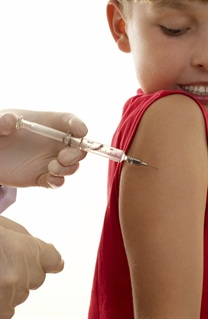
A message to patients from doctors in light of the recent news about measles: Make sure your children get the vaccine, and get a booster shot for yourself if you’re not sure about your personal vaccination history.
“Measles is a potentially deadly disease that is entirely preventable,” said Yale infectious diseases specialist Louise Dembry, M.D. “This recent outbreak should serve as a reminder to make sure all of your shots are up to date, and if they’re not, get vaccinated.”
More than 100 people in 14 states have come down with measles and the vast majority are in California, according to recent reports from the Centers for Disease Control and Prevention (CDC). Most of those cases are believed to be part of an ongoing outbreak that first emerged in Disneyland in California and involve people who weren’t vaccinated against the highly contagious disease.
No cases have been reported in Connecticut this year, although five were reported in 2014. The current outbreak is occurring 15 years after measles was declared eliminated in the United States.
Measles is spread through the air via infectious droplets from people infected with measles, and public health officials believe sporadic outbreaks usually start from people who do not receive the measles vaccine, which the CDC reports is 97 percent effective. Children typically receive their first shot of the MMR vaccine, which includes protection against measles, mumps and rubella (German measles), around their first birthday, and a second inoculation before kindergarten. The American Academy of Pediatrics, the American Academy of Family Physicians and the CDC all recommend children receive the MMR vaccine.
Opting against the vaccine
Most Americans born before 1957 have had measles and are immune, and most others have been vaccinated. Connecticut requires immunization objections, as can a child or adult with a medical condition that contraindicates the vaccination. Connecticut Department of Public Health officials estimate that fewer than 2 percent of kindergartners in the state claim exemptions.
This is risky, because while measles has been virtually eliminated in the United States since 2000, “it’s not gone from the rest of the world,” said Dr. Dembry. “Most of the reports involve unimmunized people coming from places where the disease remains common. If they’re already incubating measles, they can then easily spread it to other unprotected people here.”
In an article in the New Haven Register, Yale pediatrician Eugene Shapiro, M.D., an expert in infectious diseases, said, “Generally, we’re protected because of herd immunity. … It gets stopped in its tracks if nobody who’s been exposed gets the disease.” However, he called the current outbreak “a significant threat. It’s not trivial, let’s put it that way. There’s been a large increase in unvaccinated people.”
Celebrity Jenny McCarthy, one activist speaking out against vaccines, has claimed they are linked to an increase in autism. Dr. Shapiro told the New Haven Register that the original seminal study that claimed a causal association was exposed as fraudulent, and there are numerous large studies that prove that the vaccine is not associated with autism.
Know the symptoms
Symptoms of measles include runny nose, fever, cough, and rash (usually starting at the hairline and moving down the body). Although symptoms typically resolve within a week, patients feel miserable. However, in some cases measles can cause pneumonia, and in about 1 out of every 1,000 cases, encephalitis that can be fatal.
People are infectious during the four days before and the four days after the rash starts. While there is no specific treatment for measles, the vaccination can be effective in preventing measles if given anytime up to 72 hours after exposure. Anyone who is exposed to measles should contact their doctor immediately.
This Article was submitted by Mark Santore, on Friday, February 06, 2015.
Source: Yale Medical Group